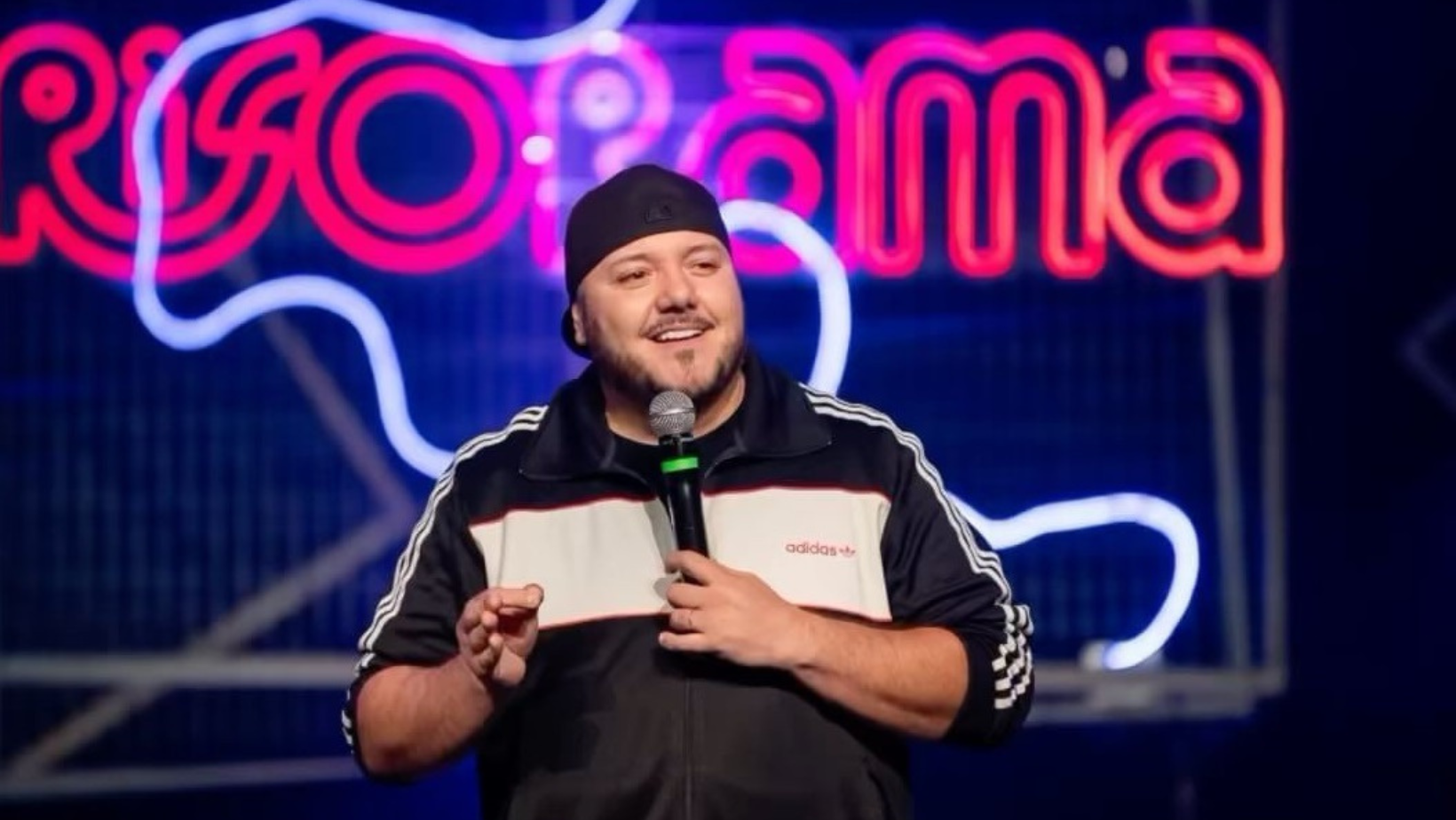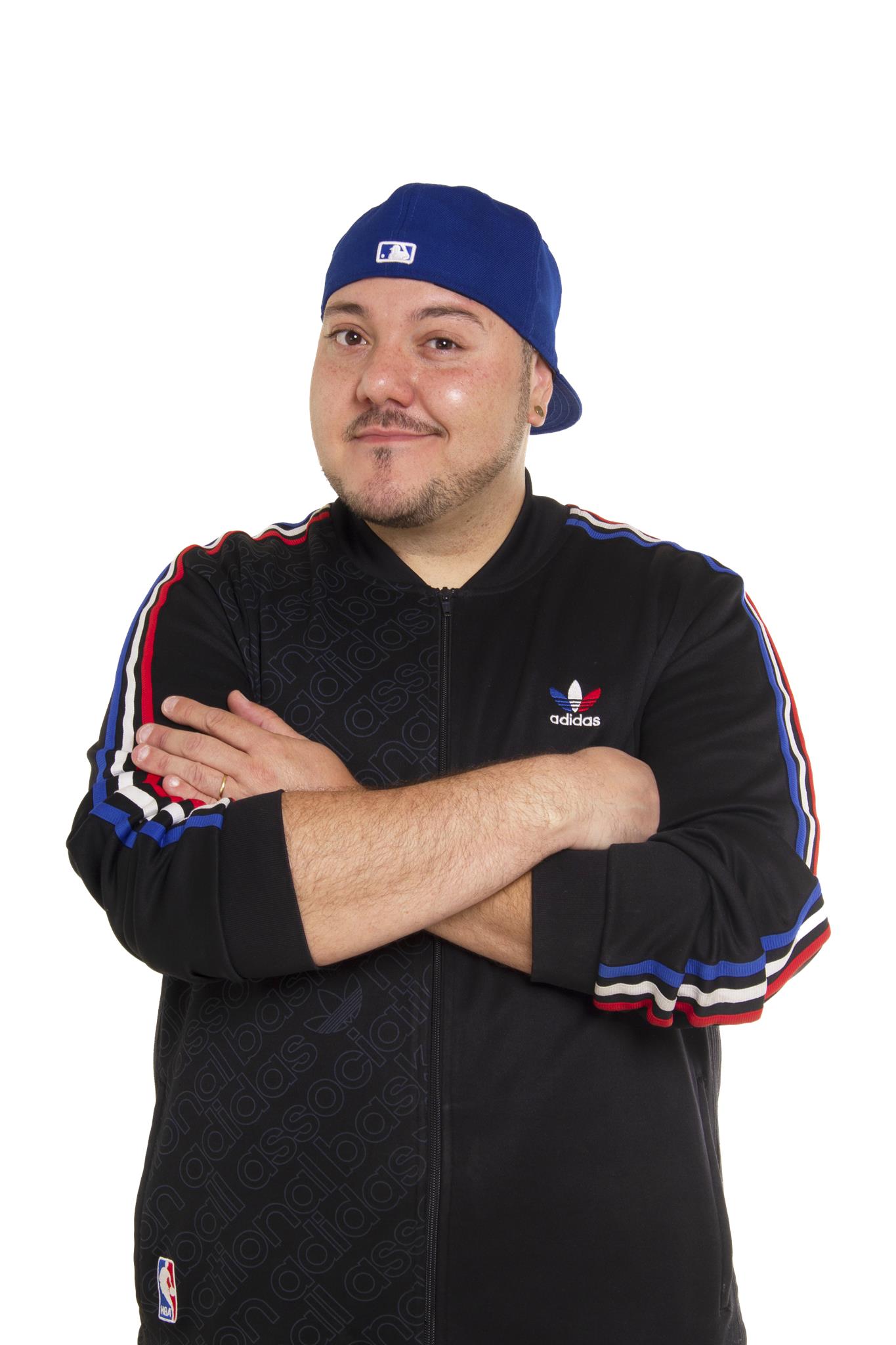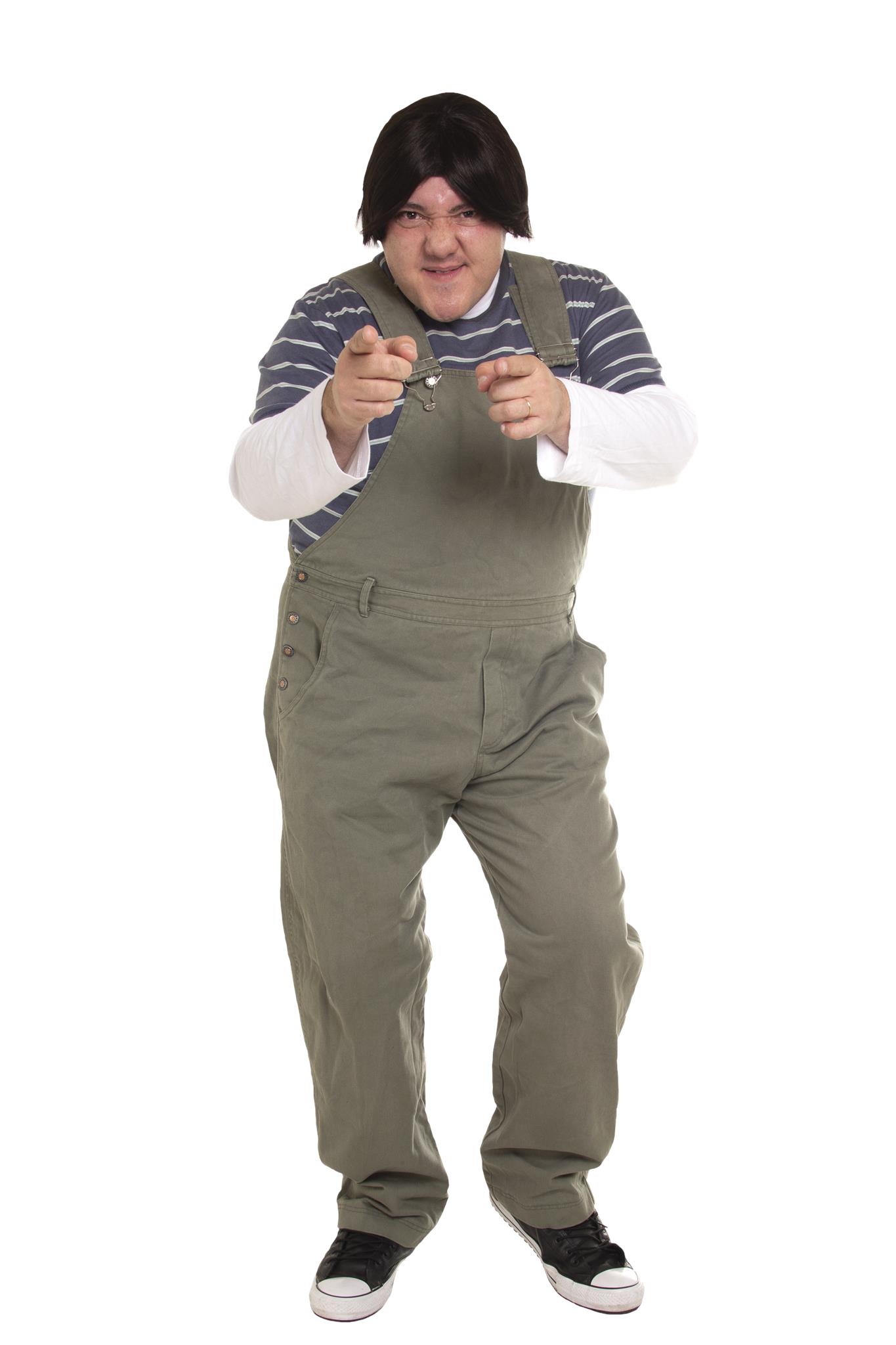
Rodrigo Cáceres, the multifaceted artist who began his career imitating the iconic Zacarias dos Trapalhões, reflects on his journey from his first steps on MTV to becoming one of the most renowned imitators and comedians in Brazil. Starting his career in 2005 on the program “Covernation”, Cáceres quickly gained recognition and became a constant figure in major television productions, such as “Show do Tom” and “Pânico”. His ability to transform imitation into a recognized art led him to participate in more than 30 TV programs and win over the public with his versatility.
In addition to his career on television, Rodrigo has stood out in dubbing and voiceover, areas that he initially postponed to focus on comedy. The 2020 pandemic was a milestone for his return to dubbing, resulting in notable roles as Patrick’s father in “The Patrick Stars Show” and appearances in international series such as “One Piece” and “Casa de Papel”. His international experience, with tours in Japan and the United States, also contributes to his career, showing the warm reception of the Brazilian public abroad.
Rodrigo Cáceres continues to explore new artistic frontiers and reinvent himself, now involved in projects such as João Kleber’s program and the judging panel on “Canta Comigo”. With a career marked by diversity and innovation, he remains passionate about art, always looking for new challenges and opportunities to delight his audience.
Rodrigo, you started your artistic career imitating the character Zacarias dos Trapalhões. What was that experience like and what did it mean to you at the beginning of your career?
I started imitating since I was a child, actually. At school, I already imitated my friends, teachers, and so on. But professionally, it was Zacarias who really opened the doors for me. I started on the Covernation program, on MTV, with Marcos Mion presenting in 2005. It was a cover band duel program, and the judges were also lookalikes and covers. I was an imitator of Zacarias, still in the learning process. It wasn’t a wonderful imitation yet, but it was incredible because, from then on, television, which was very strong at that time, started to notice that Zacarias was on TV. This made other programs start calling me, such as Show do Tom, Pânico, Faustão, Comedy Central, Domingo Legal, Ana Hickmann. I worked on several TV shows, participating frequently.
When Covernation ended, I did two more programs on MTV, including Quinta Category, with Casé, Peçanha and Marcos Mion presenting. I was part of the supporting cast, alongside people like Gui Santana, Dani Calabresa, Madame M, among others. It was a really cool phase. Afterwards, I participated in several VMBs on MTV as well. It was an incredible experience for me, especially because I was very young and already knew so many people from music and television, especially at the height of MTV. Participating in programs with people I was a fan of was very rewarding. Starting by imitating Zacarias, one of my favorite comedians, and seeing how this imitation got me here is something that makes me very happy.
You are an extremely versatile artist, working as an actor, comedian, announcer, impersonator and musician. How do you manage and balance all these facets of your career?
In fact, this versatility emerged as I discovered my talents. I never intended to be a comedian. When my mother asked me what I wanted to be, I said I wanted to be an artist. The desire to be an artist came about due to dubbing. When I was little, I watched cartoons and was fascinated by the voices. After finding out how it was done, I decided I wanted to do the same. So, I started studying theater and ended up doing six years of theater at Macunaíma. After that, I studied at other schools and took dubbing courses.
However, the work with Zacarias started to work out, and I had to postpone my dream of dubbing. I only dedicated myself to dubbing again in 2020 and have continued to this day. I manage my activities according to the season and what is popular. When the comedy started to work better, I focused more on that and left dubbing a little aside. During the pandemic, I got back into dubbing, put more effort into it, and started sending more material to the studios. I’m also a broadcaster and I have a mini studio for that. Furthermore, I am an actor and participate in films and series. Recently, I participated in the series Desires SA which is on Starz, the film 2 Coelhos, and the international film Nine Days.
Managing all these activities is not easy and is tiring, but for now I can handle it. Versatility is very important for the artist, as it allows you to explore different styles and work more. I joke that the only thing I haven’t done in art yet is a soap opera. I’ve done everything: film, dubbing, voiceover, television, theater. Who knows, maybe one day I’ll make a cameo in a soap opera? It would be nice!
You are considered one of the most important imitators in Brazil, with a repertoire of more than 100 voices. What are the challenges and rewards of being an impersonator?
The first imitation is always really cool, especially when you’re in a circle of friends and people ask you to imitate someone. It’s fun and rewarding. The true reward of imitation is when you can capture the voice and mannerisms accurately, and the person you identify likes and approves of your imitation. This is what really validates your work.
For me, the biggest challenge is, for example, getting the characteristics of someone like Faustão, who took almost two years to get the mannerisms right and avoid comparisons with other imitations, like Pedro Manso. I never start imitating someone from another imitator; my focus is always on the original artist. This allows me to capture characteristics that other imitators may not have noticed. It’s my vision and my version of imitation.
On television and radio, the challenge is to measure imitation so that it does not become pejorative. The objective is to pay homage, and, in more informal situations, such as in theaters or closed shows, you can be a little more daring. Receiving compliments from people you imitate is a great honor. For example, when I imitated Netinho de Paula on the program Máquina da Fama, he tweeted saying that I was his best imitator, which was a great honor for me. Selton Mello, when he was interviewed on The Danilo Gentili, really praised my imitation of him after watching some videos, and I was very happy with that. Milton Cunha also reposted a video of me imitating him, which was great.
If you imitate in a respectful and fun way, the reward is much greater. It’s amazing to see artists in situations you wouldn’t normally see them in. This makes the work even more rewarding.

You have toured in Japan and the United States. How was the reception from the international public and what were the main differences you found compared to the Brazilian public?
Doing international shows is really incredible, both for your career and your CV. My first experience was in 2013, when I went to Japan. We stayed for 30 days and did more than 25 shows there, for Brazilians, of course, but there were also many Brazilians married to Japanese people and others who lived there. The reception was very warm, similar to Brazil, but with one difference: the people who have lived in Japan for a long time work a lot and are quite lacking in these cultural manifestations. So, they treated us like celebrities, offering gifts, hugs and lots of affection. They are Brazilian people who have been in Japan for a while, and despite maintaining their Brazilianness, they absorb a lot of Japanese culture, which is known for its exceptional politeness and courtesy.
It was a very rewarding experience, and afterwards, they did a poll there to find out who they would like to return to Japan to do shows. I was one of those chosen and returned in 2017 for a new series of presentations, this time for 12 days.
In the United States, we did a show in New York during a visit to Japan. I stayed there for a few days and the show was very positive. Until now, we have only done shows for Brazilians, and the reception is always very warm. Japan is a wonderful country and New York is always a special place for me, as I already know the city well.
It’s always a pleasure to be in another country doing shows, and it’s great for your CV. We may have a US tour soon, and I would be happy to share more details with you if that happens.
You have participated in more than 30 TV shows throughout your career. What was your most memorable appearance and why?
I’ve been on more than 30 television shows, almost every one you can imagine. The exceptions are “Jô Soares” and “Hebe Camargo”, which I almost participated in, but other than that, I did almost all the others. I know a lot of people from television, including producers who started as interns and are now directors. It’s an environment where everyone respects me a lot and I respect them equally.
It’s difficult to pinpoint a specific moment that was the most memorable, as there were so many. However, a remarkable experience was when I went to present “Quem Chega Lá” at Faustão in 2010. I performed four Sundays in a row, at a time when the audience was very high. This opportunity really changed my career and my financial life. To this day, I remember that moment with great affection, as it was a turning point for me.
Another special moment was working on “Tom’s Show” with an idol of mine, an artist that I really admire in my segment. This was extremely rewarding and enjoyable.
You were a regular member of the program “Encrenca” on Rede TV. What was the experience of working on this program like and what were the most memorable moments for you?
Working on “Encrenca” was a really cool experience, but it was a slightly different phase. The program had already gone through several reformulations, and at the time I participated, we started to bring new ideas. We decided to do something different from video reacts, like “Pânico” did, and created pictures like “Porta de Festa” and other innovations. The phase we were going through was very good, but the program ended up not lasting long due to internal issues, wear and tear on the name and team problems.
In “Encrenca”, I was able to play many new characters, such as “Dia do Vigor”, and imitate Datena and Faustão, who generated a lot of audience. It was a very enriching period for me, and the experience was valuable.
Now, I’m involved in a new project, which is a João Kleber program. We are recording some frames and doing an on-air pilot. The program premieres in August and promises to be a mix of “Pânico”, “TV Pirata” and “Perdidos da Noite”. I’m excited about the different format and grateful to have been asked to participate, especially because I think my work on “Encrenca” and the good relationships I maintained contributed to this.
I love television, even though some think it is in decline. TV still has its power and it’s very rewarding to be in front of the camera, play characters and make the audience laugh. Additionally, I work with social media, cinema, voiceover and dubbing, but television still holds a special place for me.

What’s it like to be part of the panel of 100 judges for the musical reality show “Canta Comigo” and “Canta Comigo Teen” on Record TV?
The program “Canta Comigo” was a big surprise in my life. A producer friend asked me to participate, and I joined the program when Rodrigo Faro took over, after Gugu passed away. I stayed with Faro from the first season.
“Canta Comigo” is a program linked to music, with a panel made up of singers, music producers, speech therapists and singing teachers. Although many don’t know, I also have a strong connection with music. I’m a musician, drummer and singer, and I’ve played drums for over 10 years. My experience with voice acting, dubbing and imitation brought a humorous touch to the program.
The coolest thing about the program is the coexistence and friendships we make. The atmosphere behind the scenes is very pleasant and unique, with a mix of different artists and personalities. It is gratifying to meet and make friends with people like Caju e Castanha, Canisso do Raimundos, who unfortunately passed away, and many others. Recordings are tiring, but the experience of seeing so many talents and learning daily is wonderful. It’s an honor to be on the show for so many seasons.
You have stood out in dubbing several important projects. What was the transition into this field like and what was the most challenging character you’ve voiced so far?
I’m slowly gaining my place in dubbing. Dubbing is a more difficult medium to enter and maintain, because it requires being an actor first. As I mentioned before, I started to be interested in being an artist because of dubbing, but I ended up postponing that dream.
During the 2020 pandemic, with work reduced, I decided to focus again on dubbing. I took an online course to refresh my knowledge and started sending my material to studios. This resulted in some tests, and in the second test, Wendel Bezerra, SpongeBob’s voice actor and owner of Uniband, told me that he believed in my versatility for the character.
In the studio, we don’t know what we’re going to dub, everything is very confidential. We left our cell phones out and signed confidentiality agreements. When I saw the material for the test, it was a Patrick series, called “The Patrick Stars Show”, where I would play Patrick’s father. Imitation helped me because dubbing requires you to reproduce the original actor’s interpretation in another language. The ease I have with imitations helped capture the essence of the character’s voice.
I was chosen for the role and that opened doors for other projects. I’m currently voicing in “One Piece”, a series well known worldwide, and I’ve participated in projects such as “Casa de Papel” and “Futurama”. Although I am not yet a widely known voice actor, I am doing significant work and have the dream of voicing important characters in major productions.
The biggest challenge for me has been voicing human characters, but with practice and experience, I’m getting better. I’m on the path to becoming a great voice actor, and I’m continuing to work towards that goal.
Who have been your biggest inspirations in the world of comedy and impersonation, and how have they influenced your work?
Talking about influences on comedy and imitation is complicated because I admire a lot of things. In the United States, I always liked Jim Carrey, Robin Williams, Eddie Murphy, Adam Sandler, Chris Tucker, Chris Rock and Dave Chappelle. These old comedians, and some of the more current people, are big influences on me. Eddie Murphy, Jim Carrey, and Robin Williams did amazing impersonations in their shows, and I always loved that; It’s really my thing.
In Brazil, my references include Tom Cavalcante, the comedians of Trapalhões, Ronald Golias, who I consider one of the best in the world, and Chico Anysio, who is a master of masters. I also learned a lot from programs like “Café com Bobagem” and listened to a lot of radio, where I followed Tatá Werneck, Sérgio Mallandro and Jô Soares.
Furthermore, I met and followed the work of many new generation comedians, such as Carioca and others who gained prominence with the program “Pânico”. In stand-up comedy, I started alongside names like Danilo Gentili, Rafinha Bastos, Marcela Leal and others. I started to stand out a little later, in 2006, 2007, and I met and learned a lot from these people. So, my references are very diverse and cover several generations and styles of comedy.

You took several courses to specialize in different areas. What was the course or educational experience that most impacted your career?
I studied a lot, because sometimes people think that in art it is not necessary to study, but it is totally the opposite. When I told my mother I wanted to be an artist, she said: “Then let’s study.” So I started taking courses. First, I took a drum course to understand tempo and rhythm. Then I studied singing, took a public speaking course and graduated in radio and TV. I also studied advertising and advertising, which gave me a good idea of creation and scriptwriting.
Furthermore, I took a dubbing course and studied theater for many years. All of these courses were important and continue to be useful in my professional life. I worked at my aunt’s company for 11 years, in various areas such as commercial, financial and legal, which gave me experience in administration and planning. This background helped me know how to sell my image and manage my career.
What sets my work apart is the versatility of my show, which includes more than 60 impersonations, live dubbing, stand-up comedy and music. It’s a complete show that no one does nowadays with so much variety. This brings me recognition and it is gratifying to be appreciated for my versatility.
Among all the courses I took, the one that impacted me the most was theater. Theater was the basis of everything for me, because it helped me overcome my shyness, to be more creative and open, both physically and intellectually. It prepared me to act in any field, face audiences and dub with confidence. So, theater is, without a doubt, the course that has impacted me the most to date.
Follow Rodrigo Cáceres on Instagram


